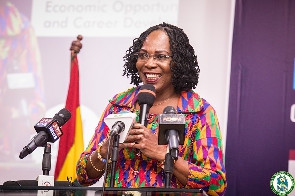The Chief Executive of the Accra Metropolitan Assembly (AMA), Hon. Elizabeth Naa Kwatsoe Tawiah Sackey, has signed a petition against Waste Colonialism by the Global North in developing countries like Ghana.
The First Female Mayor of Accra signed the petition at a town hall meeting organised by the OR Foundation, a global Non-Governmental Organisation (NGO) in Ghana as part of activities to push for the Extended Producer Responsibility (EPR) Fund for Ghana to support markets like Kantamanto in Accra to address textile waste management.
According to the petition manufacturers and importers of textile products should bear a significant degree of responsibility for the environmental impacts of their products, throughout their lifecycle, via the Extended Producer Responsibility (EPR) framework.
The petition among other things aims at holding the EU accountable and mitigating the impact of Waste Colonialism in the Global South.
Signing the petition, the Mayor of Accra said developing countries like Ghana deserved good quality and wearable clothing, which is why the OR Foundation had partnered with the AMA to petition countries engaged in shipping second-hand clothing of less standard to Ghana to desist from that.
"There isn't efficient regulation of what is shipped to us...The traders have no choice but to throw the waste garments away, which adds to the overflowing landfill sites... We must all support this campaign and sign the petition to compel these countries to stop importing unwearable clothing to Ghana," she said.
Co-Founder of the OR Foundation, Liz Ricketts, in an interview at the event said, “We are here to call for Extended Producer Responsibility (EPR) policies to be globally accountable to fight Waste Colonialism. Meaning that if clothing is going to come to Ghana, from outside of this country, Ghana cannot be used as a dumping ground...If clothing is going to come to Ghana, then money should come as well to support the development of new infrastructure for recycling to improve the market ecosystem, to ensure that the people who work in Kantamanto every day are no longer going into debt, handling the waste of other countries”.
She noted that OR Foundation’s research conducted over the years had found that 40% of the average bale of clothing opened in Accra’s Kantamanto Second-hand Clothing Market leaves the market as waste adding that this leads to increasing debt of about $1.58 per garment for each bale sold to thousands of retailers working within this trade.
"France is the only country with the EPR policy in textiles and unfortunately it is a Waste Colonialism policy. France keeps all of the money in France but sends 80 percent of the clothing (second-hand) they collect from their own citizens to the continent of Africa including here in Ghana... We are saying that this is not fair and that it’s not an effective policy. Because if the money is supposed to go and cover waste management and the waste is ending up here and the money is not coming here then that is a problem”, she added," Mad. Liz said.
Director of Waste Management Department, Mr Solomon Noi, pledged the AMA's commitment to supporting the Extended Producer Responsibility (EPR) policy and emphasised that the policy sought to stop the importation of low-quality second-hand clothing into the country and reminded the Global North of the adverse effects second-hand clothing has on the waste value chain in Accra.
"So either the quality must go up, or the Extended Producer Scheme and the little money that accrues from it should follow the unwanted materials that come. Because after all the end of life for those materials from the innovators ends up on our shores. This is what we can tap as a city authority to implement the infrastructure that is needed to treat the waste before land filing,” he said.
“This advocacy is not to stop the second-hand clothing entirely but to raise the quality of the waste that is coming as well as solicit funds through the Extended Producer Responsibility scheme to help all of us along this value chain and make sure that our city is free of these waste materials that are choking the ocean for us,” he added.
So far, over a thousand retailers and tailors have signed onto the agreement before making it public. Many market women in Kantamanto have taken it upon themselves to become ambassadors for this policy, sharing with their colleagues and making everyone know how this could support their community.
To support this project, kindly visit stopwastecolonialism.org and sign the position paper.
Regional News of Tuesday, 28 March 2023
Source: classfmonline.com

















